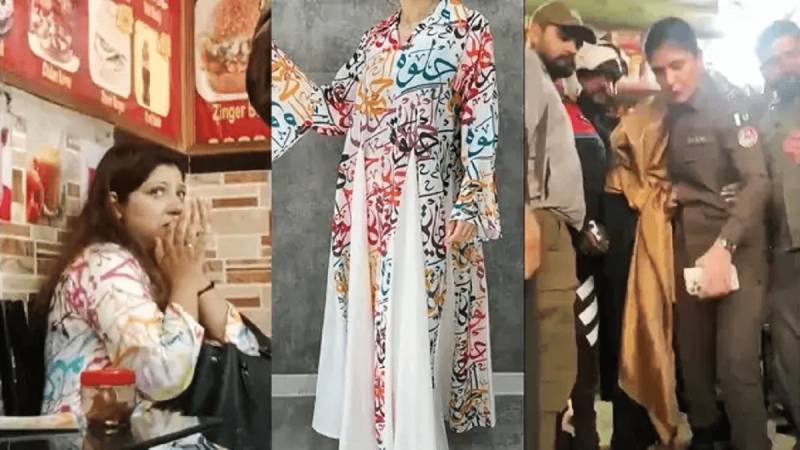
The dramatic incident that took place at Lahore's Ichra Bazaar on February 25, 2024, may be over, but lessons learned from it will be remembered for a long time. It is a particular moment to feel proud as timely action averted an intimidating scene from receding into chaos and violence accompanying such volatile incidents where a victim is accused of blasphemy. It is particularly significant as a woman's dignity, being helpless before an enraged mob, was saved from being molested.
Media highlights reflected the valiant heroism of the lady police officer, ASP Shehrbano Naqvi, who managed to steer her way through the charged crowd at the speed of a bullet, negotiated with convincing rationale, and rescued the victim bravely to a safe exit. The accolades received in recognition of her bravery and meticulous performance in the line of duty, nationally and internationally, are much appreciated, particularly in a male-dominated society, where feats of women usually go unnoticed and least admired. However, in this dramatic unfolding of events, there were other unsung heroes worthy of acknowledgement who went unnoticed.
The shopkeeper, Johnson Tariq, who protected the victim in his small shop against blatant threats by pulling down the shutters amidst a charged mob, called '15' using his strength of mind and waited for the police, defenceless, while battling with the constant fear of being lynched and the ensuing danger of violence by a charged crowd at his doorstep deserves no less recognition, honour, and credit like the ASP. He was neither a member of any law enforcement agency nor acting in the line of duty, yet his valour remained undeterred.
The time lag between his call and the arrival of the police was no less than signing his death warrant. It is inspirational heroism how a Christian risked his life for a Muslim when he was a member of an underprivileged minority community. He attended to the call of his conscience, putting his business and life in serious peril all for a stranger. How many of us can find the courage to take significant risks or make a great sacrifice to achieve a noble goal?
While the ASP was making headlines, Johnson was in oblivion. His story was unearthed by a blogger on social media, and this fact casts questions about the standards of fair media reporting. The misreporting, if any, seems to stem from ignorance rather than prejudice in this case. A Christian endangered his life to save a Muslim woman is a heroic endeavour that deserves high projection at the national level.
In this incident, there was actually more than one saviour, and they all deserve recognition and reward
If the Quaid-e-Azam Police Medal can be recommended for the ASP, who was armed and assisted by a contingent of the police force, then a civilian medal may be considered for the gallantry of the unarmed and defenceless Johnson by the ruling regime. In the background of horrific tales of religious extremism and intolerance, which the Christian community have borne, intermittently, at the hands of frenzied Muslim mobs ransacking their houses and churches, not sparing their lives, this is a tale of utter heroism, human empathy, and reflection of interfaith harmony that should be highlighted.
Another paradox that went unnoticed was that the ASP was not alone but the glorification in media only captured her story. To her goes the credit of reaching to the heart of the scene and defusing the situation. But she acted at the command of her seniors, in the line of duty, who were around her for support while backed by a huge police force. The rescue operation, though, could not have been successful without good planning and teamwork, and this could have been applauded nationally for raising the morale and spirit of the entire team.
In this incident, there was actually more than one saviour, and they all deserve recognition and reward. This one incident may usher a few lessons for society as a whole. First, the credit should be given where it is due regardless of position, power and social status. The analysis of the news and media coverage of the incident highlighted disproportionately the extraordinary police performance while overlooking the humble feat of the unarmed civilian, Johnson, in rescuing the victim at the risk of his life.
Such disparity is widely prevalent in our organisations and society, undermining merit and fair analysis whilst reinforcing biased perspectives. At times, the seniors get accolades for certain achievements while ignoring their team members, without whom the achievement was not possible. For example, a customs officer cannot confiscate contraband and detect evasion of duty without his team of Inspectors. A police officer cannot trace crime without the assistance of his DSPs/ ASIs. This is where corrective action is required to allow the team to take credit for achieving organisational goals and upholding principles of fairness, accuracy, and inclusivity, ensuring all are fairly recognised.
Second, the way the lady ASP was projected should become the norm, and every organisation and institution should eulogise the high-achievers in their ranks and celebrate their extraordinary feats. Women need a high degree of appreciation and effort for gender mainstreaming since they are part of marginalised segments of society.
Third, the vulnerability of women needs to be addressed through effective legislation. The dress code of a woman has always triggered emotive responses and provided fodder for fundamentalism. Whether it is Iran's morality police, which tortured and killed 22-year-old Mahsa Amini for allegedly not wearing the hijab according to Islamic standards, or Pakistan, where a lady barely escaped an attempt on her life by fundamentalists over an alleged un-Islamic dress design, women need to feel safe in public and workplaces from incidents of obvious harassment and discrimination.

